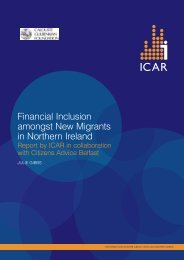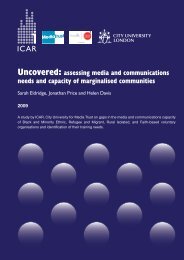Navigation guide Refugee populations in the UK: Algerians - ICAR
Navigation guide Refugee populations in the UK: Algerians - ICAR
Navigation guide Refugee populations in the UK: Algerians - ICAR
Create successful ePaper yourself
Turn your PDF publications into a flip-book with our unique Google optimized e-Paper software.
een Algerian, though many of those people arrested have been released without charge (see key issues<br />
section).<br />
Only one Algerian has been conclusively l<strong>in</strong>ked with ‘serious non-political crimes’ <strong>in</strong> <strong>the</strong> British courts (see<br />
below). This occurred <strong>in</strong> 1996, well before ei<strong>the</strong>r of <strong>the</strong>se acts was passed, and suggests that previous<br />
legislation may have been sufficient to protect Brita<strong>in</strong> from violent <strong>in</strong>dividuals.<br />
The case of T<br />
T claimed asylum <strong>in</strong> <strong>the</strong> <strong>UK</strong> <strong>in</strong> 1994. He admitted <strong>in</strong>volvement <strong>in</strong> a bomb attack on Algiers airport <strong>in</strong><br />
which 10 people had died but argued that this was a political act and should not bar him from refugee<br />
status <strong>in</strong> <strong>the</strong> <strong>UK</strong>. His case eventually went to <strong>the</strong> House of Lords <strong>in</strong> 1996, and has become an important<br />
test case for <strong>the</strong> exclusion clause (Article 1F) of <strong>the</strong> Geneva Convention. In his judgement, Lord Mustill<br />
argued:<br />
‘Those who use violence and fear to struggle aga<strong>in</strong>st oppression may <strong>the</strong>mselves be<br />
oppressors, caus<strong>in</strong>g as much suffer<strong>in</strong>g to <strong>the</strong> defenceless as those whom <strong>the</strong>y seek to<br />
displace. When <strong>the</strong>y flee to a foreign country <strong>the</strong> impulse to protect <strong>the</strong>m from persecution<br />
rema<strong>in</strong>s, but it is muted. The community as a whole has a moral right to protection, which<br />
should not be compromised by offer<strong>in</strong>g too ready a refuge to those who, hav<strong>in</strong>g embroiled <strong>the</strong><br />
population <strong>in</strong> violence, f<strong>in</strong>d <strong>the</strong>mselves on <strong>the</strong> los<strong>in</strong>g side.’ 1<br />
Although Lord Mustill accepted that, but for <strong>the</strong>se violent acts, T would be considered a refugee, this<br />
violent activity was sufficient to exclude him under article 1F. This f<strong>in</strong>d<strong>in</strong>g is important s<strong>in</strong>ce on <strong>the</strong> only<br />
occasion when it has been demonstrated that an Algerian has been <strong>in</strong>volved <strong>in</strong> violent activity, <strong>the</strong> legal<br />
framework that existed <strong>in</strong> 1996 was sufficient to exclude him from protection as a refugee.<br />
1 T v Secretary of State for <strong>the</strong> Home Department House of Lords [1996] 2 All ER 865, [1996] 2 WLR 766.<br />
<strong>Navigation</strong> <strong>guide</strong> to refugee <strong>populations</strong>: <strong>Algerians</strong><br />
©<strong>ICAR</strong> 2004, moral rights Michael Collyer<br />
25

















